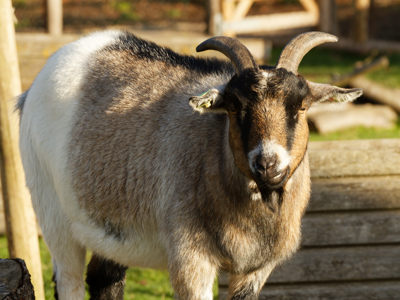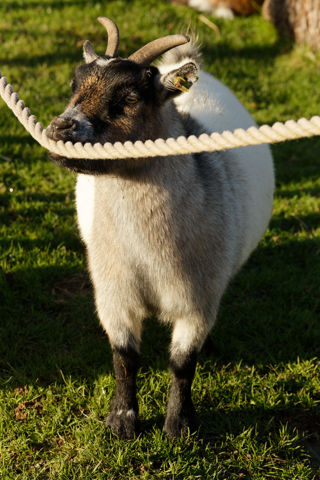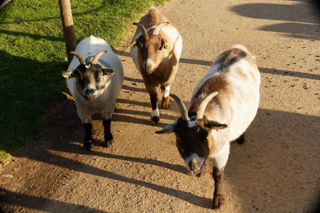
Domestic Goat
Goats were first domesticated in the Middle East around 10,500 years ago from the wild goat (Capra aegagrus). They are short and stocky and can appear in a variety of different colours. The goat is a hardy animal, and easy to care for. As small animals they need less space than other hoofed animals; a stable at least 2x2m and access to a paddock are all that is required. Fresh water and a salt lick must be accessible at all times.

Goats become sexually mature at an early age. Females can breed from the age of twelve months, although most breeders will wait until they are 18 months. This is because a pregnancy at a very young age can damage the mother’s growth. Males are sexually mature at 5 months so separating male kids from their mother at this time is important. Kids are born well developed and can be separated from their mother as early as four days old.

The diet of the domestic goat mimics that of their wild goat ancestor. Good quality hay replaces most of the grass and leafy branches (browse) need to be provided. Ideally, the goat will have access to a grass paddock too.
The wild goat is threatened in the wild across their range and have disappeared from a number of areas. The main threats are hunting for skins and meat, habitat destruction and competition with livestock.
Key Facts:
Conservation Status: Not Evaluated
Distribution: Turkey
Habitat: Mountains, Scrublands
Diet: Grasses, Leaves
Height: 26 – 107cm
Weight: 9 – 113kg
Gestation: 150 days
No. of young: 1 – 3
Life Span: 15 – 20 years

SUPPORT OUR ANIMALS
If you're looking for an alternative way to donate to Twycross Zoo, you can help support our animals and our zoo keepers by purchasing something from our Amazon Wishlist!
Updated regularly by our zoo keepers, the items on the list help to provide enrichment for our animals and keep their habitats well maintained.
Every donation helps us as a conservation charity.

